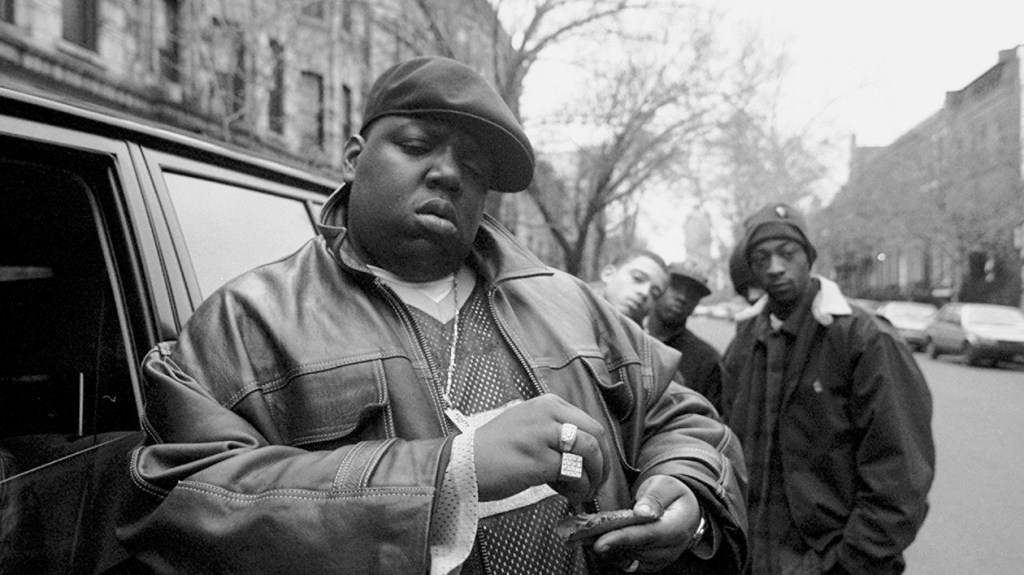Business
Page: 130
Spotify and Warner Music Group have signed a new multi-year agreement covering both recorded music and music publishing, following Spotify’s similar deal with Universal Music Group earlier this year. The partnership, announced today (Feb. 6), aims to drive innovation and increase the value of music for artists, songwriters and fans.
The agreement focuses on advancing audio-visual streaming, expanding music and video catalogs, and, notably, introducing new paid subscription tiers with exclusive content bundles. It also reinforces “artist-centric” royalty models that reward artists for attracting and engaging audiences. Additionally, the new publishing deal introduces a direct licensing model with Warner Chappell Music in several countries, including the U.S.
In a statement, WMG CEO Robert Kyncl emphasized the collaboration’s role in expanding the music ecosystem and delivering value to artists and songwriters.
Trending on Billboard
“It’s a big step forward in our vision for greater alignment between rights holders and streaming services,” Kyncl said. “Together with Spotify, we look forward to increasing the value of music, as we drive growth, impact, and innovation.”
Spotify CEO Daniel Ek highlighted 2025 as a pivotal year for Spotify’s innovation, “and our partners at Warner Music Group share our commitment to rapid innovation and sustained investment in our leading music offerings. Together, we’re pushing the boundaries of what’s possible for audiences worldwide—making paid music subscriptions more appealing while supporting artists and songwriters alike.”
During Warner Music’s August 2024 earnings call, Kyncl addressed the relationship between labels and digital service providers and refuted the notion that they are entrenched adversaries. “I know that investor attention has recently been focused on the dynamics between labels and DSPs, with some speculating that we’re adversaries playing a zero-sum game,” he said. “That’s simply not the case. We’re actively engaged with our partners around ways to drive growth for all of us.”
WMG announced its new pact with Spotify moments before reporting results for is fiscal first quarter, which saw a dip in revenue that it attributed to the termination of its distribution agreement with BMG, among other factors. The label group on Thursday also announced that it had agreed to purchase a controlling stake in Tempo Music Investment, a catalog company that owns rights to songs by Wiz Khalifa, Florida Georgia Line and others, in a deal sources say is worth several hundred million dollars.
Warner Music Group is buying a controlling stake in Tempo Music Investment, a catalog company that owns rights to songs by Wiz Khalifa, Florida Georgia Line and Brett James, in a deal sources say is worth around $450 million. WMG said it will acquire the stake from Tempo’s founder, Providence Equity Partners. Providence will remain a […]
It’s been nearly five years since Pop Smoke (Bashar Jackson) was killed in California’s Hidden Hills — and now, the only adult defendant in the murder trial has reached a plea deal. According to Rolling Stone, Corey Walker, 24, pleaded guilty to voluntary manslaughter and home invasion robbery charges in Los Angeles court on Wednesday […]
Reggaetón star Nicky Jam has signed a new global agreement with Virgin Music Group after spending more than a decade with Sony Music Latin.
Under the new agreement, Nicky Jam’s new music will be distributed by Virgin Music Group, which will also administer and supervise Nicky Jam’s catalog for YouTube and will work some material in digital platforms in different territories.
Nicky Jam (born Nick Rivera Camerino) disclosed the terms and impetus behind the deal during an exclusive interview with Billboard in Miami.
“I went with my gut,” he tells Billboard, noting that his contract with Sony had been up and he had met with several labels. “I thought it was the best thing to do. I have too much respect for Afo [Verde, chairman of Sony Music Latin Iberia] and my Sony family. I owe a lot to them and I love them very much. It’s just that sometimes you feel you have to move. I’m very spontaneous and that’s just the way I am. I could say I’m a bohemian. I take my luggage and I go wherever I have to go.”
In this case, Nicky Jam decided to go with a company that is giving him broad latitude. He’ll get to retain ownership of his masters, and will also have wide latitude in determining when he releases his music.
“It’s a distribution contract, but under that contract I can come out with music whenever I want. They are not going to mess with my creative part and that’s beautiful,” says Jam.
Nicky Jam’s new label deal coincides with a series of major changes in both his personal and professional life. Last year, he got married (to 22-yer-old model Juana Valentina Varón], split with his longtime manager Juan Diego Medina and spoke openly about his problems with alcohol and quitting drinking.
From left: Larry Gonzalez, David Daza, Michael Cantor (VMG SVP, Business Affairs and Development), Chi Orjiakor (VMG VP, Strategy), Victor Gonzalez (VMG, President of Latin America and Iberia), Nicky Jam (Artist), and Armando Rodriguez (VMG SVP/General Manager of Latin U.S.).
Courtesy of Nicky Jam
Now, a fit and trim Nicky Jam is readying to release new music that he says reflects his current, positive state of mind. “If you listen to my last album, it was called Insomnio. It was mostly what I was going through: Drinking, partying, it was all dark,” says the singer. “This is the new Nicky Jam,” he adds.
“Nicky has been a true pioneer in Latin music,” says Victor González, president of Virgin Music Group for Latin America and the Iberian Peninsula. “Having him choose Virgin Music Group for this new chapter of his career is incredibly rewarding for me and our entire team.”
Armando Rodríguez, general manager of Virgin Music Group for the U.S. Latin market adds: “Nicky is creating incredible music, and we are excited to work alongside him—not only on his upcoming releases but also in developing a strategic approach for his entire catalog.”
In the past couple of years, Virgin has notably expanded its Latin footprint, signing major names in Mexican music like Carín León, Pepe Aguilar, Angela Aguilar and Espinoza Paz. In the urban realm, Nicky Jam is their biggest get. The Puerto Rican star brings a legacy of hits, including the “El Perdón,” the 2015 smash alongside Enrique Iglesias that spent 30 weeks at No. 1 on Billboard’s Hot Latin Songs chart. All told, Nicky has charted nine songs on the Billboard Hot 100 and 58 on Billboard’s Hot Latin Songs chart, including five Number 1s. This week, he ranked at Nol 162 in streams globally on Spotify, a testament to his lasting appeal.
“This agreement with Virgin Music Group marks a new chapter in my artistic journey. I have always believed in the importance of evolution and adaptation, and I am confident that, together with Virgin Music Group, we will achieve incredible things,” says Nicky Jam.
Bolstered by both organic growth and additions to its repertoire, Reservoir Media posted strong gains in its latest fiscal quarter and raised its guidance for fiscal year revenue and earnings.
Revenue increased 19% to $42 million in its fiscal third quarter ended Dec. 31, the company announced Wednesday. Adjusted earnings before interest, taxes, depreciation and amortization (EBITDA), a commonly used measure of profitability, climbed 26% to $17.3 million.
During Wednesday’s earnings call, CEO Golnar Khosrowshahi cited the company’s repertoire, its ability to capture demand for its music for the 16% improvement in music publishing revenues and the 20% jump in recorded music revenues. In addition, Khosrowshahi attributed the company’s “commitment to cost containment and closely managed business operations” to the improvement in adjusted EBITDA.
Trending on Billboard
In the publishing division, price increases at streaming services helped digital revenues grow 20% to $16.7 million while mechanical royalties jumped 143% to $900,000 on the strength of physical sales of existing catalog. Performance and sync revenues improved just 2% and 3%, respectively. In the recorded music division, digital revenue grew 24% to $8.1 million, physical sales rose 18% to $2 million and sync royalties jumped 23% to $1 million. Neighboring rights revenue fell 7% to $900,000. The quarter was helped by an unspecific royalty recovery from a routine audit, said CFO Jim Heindlmeyer.
Reservoir Media has spent over $70 million on catalog acquisitions in the first three quarters of its fiscal year. Those deals include the acquisition of the catalog of South African composer Lebo Morake and the producer royalties of Jack Douglas (Aerosmith, Cheap Trick).
“The pipeline remains robust, and we continue to be excited about the opportunities that are before us, we continue to have that populated with more off market deals, and that’s a strategy that we’ve been able to execute on successfully for many years now,” said Khosrowshahi.
The company also signed a publishing deal with k.d. lang and extended its deal with songwriter Serban Cazan (“Mantra” by Jennie).
After exceeding internal expectations in the quarter, Reservoir Media raised its full-year guidance. The company now expects revenue to be $155 million to $158 million, an increase of $5 million from the previous quarter’s guidance. Adjusted EBITDA to fall within $61.5 million and $64.5 million, a $2.5 million increase.
Shares of Reservoir Media responded by climbing as high as $8.85, up nearly 9%, in early Wednesday trading before settling at $8.30, up 2.1%, by midday.
The estate of legendary rapper Notorious B.I.G. is suing Target, Home Depot and others over allegations that they sold unauthorized canvas prints of the famed “King of New York” photo that was snapped just days before his death.
In a lawsuit filed Tuesday in federal court, Notorious BIG LLC claims the retailers sold prints illegally created by iCanvas – a small firm that the estate says showed a “complete disregard for celebrities’ personality rights, lack of respect for artists’ efforts, and disdain for intellectual property law.”
“Defendants specifically chose to use Mr. Wallace’s persona, name, image, likeness … in an attempt to capitalize on their fame and extraordinary financial value,” Biggie’s estate writes, referring to his legal name, Christopher George Latore Wallace.
Trending on Billboard
The image at issue in the new lawsuit is “The King Of New York” – a portrait of Biggie wearing a gold crown in front of a red backdrop, snapped in March 1997 only three days before the rapper was killed in a Los Angeles shooting.
The photos — taken by photographer Barron Claiborne, who is also named as a plaintiff in the lawsuit — are some of the most well-known images of the late rapper. One is featured in a huge mural in his Bedford-Stuyvesant neighborhood of Brooklyn, and the plastic crown featured in the image sold at auction in 2020 for a whopping $594,750.
In their Tuesday lawsuit, the estate and Claiborne say that iCanvas sold canvas prints of the images for more than eight years without permission. In addition to selling them directly, the lawsuit claims the prints were also sold by Bed Bath & Beyond, Home Depot, Nordstrom and Target – each of which is named as a defendant in the lawsuit.
When contacted about the problem in 2023, Home Depot, Nordstrom and Target removed the offending products, the lawsuit says, but iCanvas and Bed Bath & Beyond allegedly continue to sell them.
The case claims that the sale of the images not only infringed Claiborne’s copyrights to the King images, but also breached federal trademark law and violated the rapper’s likeness rights.
“Mr. Wallace’s fan base has continued to expand since his passing,” the estate’s lawyers write. “Mr. Wallace’s persona, name, image, likeness, and artistic works are so well known that they are almost universally and instantly recognizable, even by those born after he died.”
The case could portend bigger problems for iCanvas. The lawyers for Biggie’s estate say they’re only a few of the “victims” of a “multi-year unlawful campaign” by the company to sell unauthorized prints of famous people and images, including musicians Beyonce, Prince, Jay-Z, Snoop Dog and LL Cool J.
None of the defendants immediately returned requests for comment on Wednesday.
It’s not the first time the Notorious B.I.G. estate has sued over photographs. In 2019, the estate sued hip-hop photographer Chi Modu over his famed 1996 image of Biggie standing in front of the World Trade Center. Though Modu owns the copyrights to the image, the estate claimed he was violating the rapper’s likeness rights by using it on merchandise.
That case settled last year on undisclosed terms – a deal that came with a warning from the estate’s attorneys about the use of his image: “Pictures of Christopher cannot be commercially exploited without a license from our client.”
The sprawling 32-acre Gateway Studios & Production Services rehearsal and production studio complex has announced plans for a May 2025 opening. Studio executives for the Chesterfield, Mo., facility — located about 20 minutes west of St. Louis — are now accepting reservations for the state-of-the-art facility, designed to build and rehearse major modern touring arena and stadium shows.
“This facility is designed to set a new standard for production and rehearsal spaces, both in size and innovation,” said Trey Kerr, CEO of Gateway Studios & Production Services, in a statement. “Our goal has always been to create a world-class environment where artists and their teams can prepare to bring their visions to life. Centrally located in the heart of the country, we offer unmatched access and flexibility for artists that strive to deliver unforgettable performances.”
The Gateway complex is comprised of three major rehearsal spaces: Studio 80, a 52,500 square foot rehearsal space; Studio 75, a smaller 15,000 square foot rehearsal space; and Studio 65, a 12,000 square foot space. It also includes an additional 15,700 square feet of open space.
Trending on Billboard
The spaces are designed to meet the “rigorous demands of live music tours, motion picture and television production, and corporate events,” a press release announcing the opening reads. It describes Gateway Studios as “the largest and most advanced tour rehearsal destination in the United States.”
To accommodate the needs of most modern touring shows, Gateway studio spaces were built for large, heavy shows. Studio 80 includes an 80-foot ceiling grid with a 2 million pound (or approximately 1,000 ton) weight capacity. All three studios include large receiving and staging areas with dedicated loading docks, drive-in ramps and dressing rooms with ensuite private bathrooms, offices and a catering lounge. Gateway is also equipped with redundant high-speed fiber-optic internet access from two independent service providers and a 5.5-megawatt independent backup generator system.
“We’ve designed this new facility with a clear purpose: to provide an exceptional space where creativity and technical innovation can thrive,” said Kerr. “Our aim is to offer artists a dynamic environment that seamlessly supports their production needs, from rehearsal to execution. In addition, we offer comprehensive production services to ensure every aspect of the creative process is expertly handled. Situated in a central location, we offer both unparalleled convenience and the flexibility required for artists to push the boundaries of their craft and deliver extraordinary performances.”
You can learn more at gsps.com/studios.
This is The Legal Beat, a weekly newsletter about music law from Billboard Pro, offering you a one-stop cheat sheet of big new cases, important rulings and all the fun stuff in between.
This week: Experts weigh whether Kendrick Lamar can play “Not Like Us” during his Super Bowl halftime show amid Drake’s defamation lawsuit; Spotify wins a ruling dismissing a lawsuit over streaming royalties; federal prosecutors file a superseding indictment against Sean “Diddy” Combs; and much more.
THE BIG STORY: Can Kendrick Play ‘Not Like Us’ At The Super Bowl?
Under normal circumstances, it’s silly to even ask the question. Obviously a Super Bowl halftime performer will play their chart-topping banger — a track that just swept record and song of the year at the Grammys and was arguably music’s most significant song of the past year.
Trending on Billboard
But these are very much not normal circumstances. Last month, Drake sued Universal Music Group over Kendrick Lamar‘s “Not Like Us,” claiming the label spread the song’s “malicious narrative” — namely, that Drake is a pedophile — despite knowing it was false.
That pending legal action makes it fair to wonder: When Lamar steps onto the world’s biggest stage on Sunday night, will he face pressure to avoid the whole mess by just skipping “Not Like Us” entirely?
To answer that question, I turned to top legal experts – who told me that Drake probably won’t win in court, but that corporate legal departments are also famously risk averse and might want to avoid trouble. For the full breakdown of how Sunday might go, read my entire story here.
Other top stories this week…
SPOTIFY BEATS ‘BUNDLE’ CASE – A federal judge dismissed a lawsuit filed against Spotify by the Mechanical Licensing Collective, rejecting the group’s allegations that the streamer illegally slashed its music royalty rates. The lawsuit, filed last year, accused Spotify of bookmaking trickery – namely, claiming that the addition of audiobooks to the platform entitled the company to pay a lower “bundled” rate for music. But in her ruling, the judge said Spotify had done nothing wrong under “unambiguous” regulations – and that if anything, the company had paid too much in royalties.
A.I. COPYRIGHT REPORT – The U.S. Copyright Office issued a long-awaited report on artificial intelligence. The report’s overall message was hardly groundbreaking: only human authors are eligible for copyrights, but material created with the assistance of AI can qualify on a case-by-case basis. But it included key assurances for existing music industry practices — saying using AI as a “brainstorming tool” to help write a song, or using it to assist in a recording studio session, would not automatically void copyright protection for the resulting songs.
TERMINATION GOES GLOBAL? A Louisiana federal judge issued an unusual legal decision on copyright termination, breaking with existing precedents and handing a major win to songwriters and their heirs. Ruling on a dispute over the 1963 rock classic “Double Shot (Of My Baby’s Love),” the judge said that termination rules apply not just to American copyrights but also to the rights to a song around the world – an outcome that legal experts have said would represent a “major upheaval” and could “radically revolutionize the way the music business runs.” The losing party in the case, who has warned the decision will cause “chaos,” is almost certain to appeal the ruling.
LYFT DISCRIMINATION CASE – A Detroit rapper named Dank Demoss (Dajua Blanding) filed a discrimination lawsuit against Lyft over allegations that one of the company’s drivers told her she was “too big” for the backseat of his car and that “his tires were not capable of supporting plaintiff’s weight.” In a viral video of the January incident, the driver can be heard telling Blanding that he’s “been in this situation before,” and that she needs to order a pricier “Uber XL” to accommodate her size.
UPDATED DIDDY INDICTMENT – New York federal prosecutors filed a superseding indictment against Sean “Diddy” Combs, adding additional victims and new allegations in the sprawling criminal case against him. Among the new claims: that he or his associates paid a $100,000 bribe to hotel staff to bury the now-infamous surveillance video of him assaulting his ex-girlfriend Cassie Ventura in 2016. Another civil lawsuit was also filed against Combs, the latest in a long list of such cases filed by Texas attorney Tony Buzbee.
Sean “Diddy” Combs has been hit with a pair of new sexual assault lawsuits that allege he drugged and sexually assaulted the plaintiffs and/or forced them to engage in sex acts with others during a “group-sex” party at Trump Hotel in midtown Manhattan.
Filed in New York state court on Tuesday (Feb. 4), the lawsuits — the latest to be lodged by Texas attorney Tony Buzbee against the disgraced hip-hop mogul — were filed by Jane Doe plaintiffs who say they were involved in the New York hip-hop scene in the ’80s and ’90s.
The first complaint was filed by a woman who says she was “an active member of New York’s hip-hop industry from the 1980s onward” and “appeared in numerous music videos for varying hip hop artists, was employed as a hip hop dancer for live productions, as well as having roles in major motion pictures.” According to the complaint, she was subject to “sexual assault, coercion, abuse and violence either at the hands of, or direction of Combs” on numerous occasions.
In the first alleged incident, the woman claims she was drugged and “forced to participate in group sexual activity” with Combs and others while attending (and being prevented from leaving) a so-called “shadow party” held at a New York bar sometime in the 1990s.
Later in the decade, while allegedly dating Combs’ security guard, the woman says she attended another of Combs’ parties at the five-story New York nightclub Limelight, where she says “group-sex parties” were occurring on the top two floors. After the party, she claims Combs and the security guard took her and a friend to a penthouse at a Trump hotel in midtown Manhattan, where she says she was “physically and sexually assaulted” by the guard as Combs watched. Later that evening, she claims she and her friend were forced to take “ecstasy or [a] similar ‘party’ drug” and “engage in a group sex activity that [they] did not want to participate in.”
This alleged incident is echoed in the second lawsuit filed on Tuesday by a woman who claims she was “a part of the hip-hop scene that was developing in New York City” in the ’80s and ’90s and “appeared in numerous music videos for various hip-hop artists and participated in other projects within the industry.”
After attending a party also allegedly held at the Limelight — which reads like the same event described by the first plaintiff — the woman claims she and a friend were taken to the Trump Hotel in midtown Manhattan against their will, drugged “and forced to participate in group-sex activity during which she [was] sexually assaulted over the next several hours. For instance, Plaintiff was vaginally raped by a club promoter at Combs’ direction, while Combs observed.”
The woman also outlines a second incident she says occurred after she was hired to serve as a “bottle-service attendant” at a party Combs hosted in the Hamptons in 1997. Shortly after arriving at the event, the woman says she and others hired for the event were encouraged by Combs to drink from coolers and offered marijuana, after which she “began to feel woozy, slipping in and out of consciousness.” At this point, she says she was “sexually assaulted and vaginally raped by Combs’ associates, at Combs’ direction, while Combs was present.” After suspecting the assault was videotaped, she says she reached out to Combs “to request that he delete the video, but Combs refused to comply.”
The woman further alleges she “suffered several incidences of sexual assault at Combs’ hands while traveling to other states, including California,” though only the New York incidents are included in the complaint.
Both women are asking for compensatory and punitive damages from Combs and his various Combs Global businesses, which are named as co-defendants for “enabl[ing]” the alleged abuse.
A representative for Combs and Combs Global did not immediately respond to Billboard‘s request for comment.
Combs is currently awaiting the start of his criminal trial, which is set to commence on May 5, at the Metropolitan Detention Center in Brooklyn. He is charged with running a criminal enterprise aimed at satisfying his need for “sexual gratification.” Among other accusations, Combs is alleged to have held so-called “freak offs” during which he and others drugged victims and coerced them into having sex. He is also accused of acts of violence and intimidation to silence his alleged victims. Combs faces a potential life prison sentence if convicted on all charges.
U.S. Senator Marsha Blackburn (R-Tenn.) is asking the Federal Communications Commission (FCC) to take action to prevent radio stations from offering airplay to artists in exchange for performing free shows.
In a letter sent to FCC chairman Brendan Carr on Thursday (Jan. 30), Blackburn decried the alleged practice she says is “critically impacting Tennessee’s content creators,” branding it as “payola” — the practice of accepting payment in exchange for radio airplay without disclosing it.
“As you know, the FCC considers payola a violation of the Sponsorship Identification Rules,” Blackburn wrote. “From what we have learned, it appears that to sidestep these restrictions, radio stations and networks have adopted a troubling new tactic. Instead of demanding cash or lavish perks from record labels in exchange for airplay, they now pressure artists to perform ‘free radio shows’ — also referred to as ‘listener appreciation shows’ or ‘charitable concert events.’”
Trending on Billboard
She adds that radio stations “often receive the financial benefit of these shows through ticket sales, sponsorships, and other income while the artists and record labels frequently absorb the expense.”
Blackburn claims she has heard from artists in the industry who say “it is not unusual for them to perform anywhere from 10 to 50 such shows in any given year.” She adds that artists early in their careers tend to perform more but that “those that have had more success” are still often expected to perform free shows in exchange for airtime.
“This practice is exploitative and should not be tolerated,” the letter continues. “Federal law and FCC rules prohibit radio stations from receiving undisclosed compensation for broadcasting songs, and this principle must extend to free performances for radio stations and networks. Artists should not be extorted into providing free labor in exchange for airplay. I urge you to take swift action to end this abuse and protect our music community.”
A longstanding issue in the music industry, payola was first regulated by Congress in 1960 and later became the subject of a mid-2000s investigation by the New York Attorney General’s office that led to all three major labels paying millions in penalties and agreeing to reforms, including a vow not to use “commercial transactions…in an explicit or implicit exchange, agreement, or understanding to obtain airplay or increase airplay,” among other concessions.
Despite this, there has been ongoing concern in the industry and beyond about the continued effectiveness of these regulations. In 2019, then-FCC commissioner Michael O’Rielly asked the Recording Recording Industry Association of America (RIAA) to investigate allegations of payola. In 2022, several music executives met with the New York Attorney General’s office to complain that some independent promoters hired by labels had continued engaging in the practice.
According to Blackburn, whose state’s capital city of Nashville is the heart of the country music business, the alleged free concerts are simply payola in another form, writing that there’s “often an implicit suggestion that declining to perform could result in reduced airplay” — what she characterizes as “forced quid pro quo.”
You can read Blackburn’s letter in full below.
The Honorable Brendan Carr
Chairman
Federal Communications Commission
45 L Street, NE
Washington, DC 20554
Dear Chairman Carr, Thank you for your leadership at the Federal Communications Commission (“FCC”). I am writing to bring attention to an issue critically impacting Tennessee’s content creators, particularly its songwriters and music community.
Federal law prohibits radio stations from accepting payment for airtime without disclosing the transaction—a practice commonly known as “payola.”1 As you know, the FCC considers payola a violation of the Sponsorship Identification Rules. 2
From what we have learned, it appears that to sidestep these restrictions, radio stations and networks have adopted a troubling new tactic. Instead of demanding cash or lavish perks from record labels in exchange for airplay, they now pressure artists to perform “free radio shows”— also referred to as “listener appreciation shows” or “charitable concert events.”
We have heard the new scheme works in this manner: radio stations and networks offer more airtime for an artist’s songs if the artist performs a free show. There is often an implicit suggestion that declining to perform could result in reduced airplay. Radio stations and networks often receive the financial benefit of these shows through ticket sales, sponsorships, and other income while the artists and record labels frequently absorb the expense.
This forced quid pro quo applies to essentially all artists, regardless of their level of success. Artists in the industry have told me that it is not unusual for them to perform anywhere from 10 to 50 such shows in any given year. Those just starting out in their career will often perform more, while those that have had more success will have to perform fewer, but they will still be expected to do them.
This practice is exploitative and should not be tolerated. Federal law and FCC rules prohibit radio stations from receiving undisclosed compensation for broadcasting songs, and this principle must extend to free performances for radio stations and networks. Artists should not be extorted into providing free labor in exchange for airplay.
I urge you to take swift action to end this abuse and protect our music community. Thank you for your attention to this pressing matter.
Sincerely,
Marsha Blackburn
United States Senator

 State Champ Radio
State Champ Radio 










